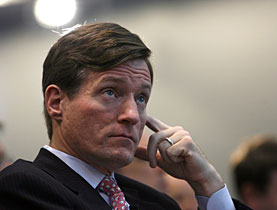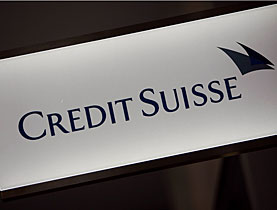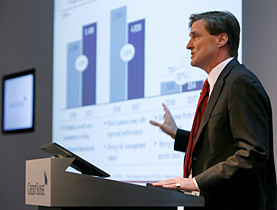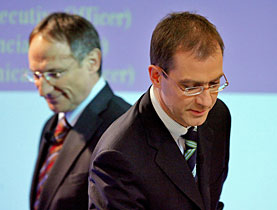Bank accuses traders of intentional misconduct

An investigation by Credit Suisse has discovered that traders deliberately overpriced assets that contributed to an inflated view of the bank's performance.
Last month the bank heralded comparatively solid 2007 results, but a week later had to write off a further $2.85 billion (SFr2.86). It issued a profits warning on Thursday despite reducing this figure slightly.
Shares in Switzerland’s second biggest bank initially slid more than ten per cent on the news and ended Thursday more than six per cent lower as investors reacted negatively in an already jittery market, which has been badly hit by the United States subprime mortgage crisis.
Credit Suisse said in a statement that “a small number” of traders had intentionally overpriced assets. An unspecified number had been sacked, suspended or disciplined.
The bank is also tightening controls that proved to be “not effective”, the statement added.
“This incident is unacceptable and it does not represent the high standard of Credit Suisse. We are taking strong action to remediate and move forward,” said Credit Suisse chief executive Brady Dougan.
The total extent of the overpricing was only slightly lower than first feared last month. Following the investigation, the bank has now reduced the valuation of its assets by $2.65 billion.
As a result, 2007 net income was revised down to SFr7.8 billion ($7.7 billion) from the previously stated SFr8.55 billion.
Profits warning
Credit Suisse has also changed its stance on projected profitability on the first three months of this year. Last month it said it should still remain in the black, but changed this prognosis on Thursday.
“In the light of the difficult market conditions in March, at this time, Credit Suisse believes it is unlikely to be profitable in the first quarter,” the statement said.
March saw further financial market turbulence in the shape of US investment bank Bear Stearns requiring emergency funding to prevent a total collapse.
Turbulence and scandals have led to calls in some quarters for stronger external regulation of the financial sector.
Mindset change
Bank Sarasin analyst Rainer Skierka called for greater transparency, but cautioned against an emotional response to Credit Suisse’s revelation.
“We have such a tight set of regulations in banking, like no other industry. But in the end, it all comes down to people, and if you have people who are greedy and betray others then this can happen,” he told swissinfo.
But he added that he is seeing a “fundamental mindset change” in the industry.
“I would be very surprised if we got out of this crisis dealing in the same way as we dealt before. The lesson of this crisis is that there should be more barriers [risk controls] to the way banking is done in future. Earnings potential should be more related to real economic factors and not just speculation,” he said.
swissinfo, Matthew Allen in Zurich
The financial sector has been severely hit by the collapse of the US subprime mortgage market – that gives mortgage loans to people with poor credit ratings.
These debts were then bought in bulk by the financial enterprises and traded on the markets. Several banks and other financial institutions around the world were then caught out by sudden and unexpectedly high levels default, leaving their investments worthless.
Switzerland’s largest bank, UBS, was worst hit by the crisis – writing off more than SFr20 billion last year. It was forced to turn to foreign investors to bail it out with a SFr13 billion emergency funding package.
Credit Suisse took a more conservative approach and had far less exposure in the risky market.
On February 12 it reported writedowns of just SFr2 billion, but its reputation has been shaken by the news of “intentional misconduct” by certain traders.
Switzerland’s largest bank, UBS, is confident that the Swiss economy will remain robust this year, but has cut its growth forecast for 2009.
Strong underlying economic factors, such as rising employment and private household consumption, point to robust expansion in 2008, UBS said on Thursday. It’s prediction of 2.3% Swiss economic growth this year remains unchanged.
“In recent months, the Swiss economy appears to have remained almost impervious to the slowdown in the US economy and the turbulence in the international financial markets,” UBS said in a statement.
Switzerland’s GDP outperformed all predictions in the last quarter of 2007, expanding 3.6% by year-on-year comparison.
However, UBS has cut its 2009 growth forecast from 1.8% to 1.4%, blaming the slowing global economy and appreciation of the Swiss franc hitting exports.

In compliance with the JTI standards
More: SWI swissinfo.ch certified by the Journalism Trust Initiative




You can find an overview of ongoing debates with our journalists here. Please join us!
If you want to start a conversation about a topic raised in this article or want to report factual errors, email us at english@swissinfo.ch.